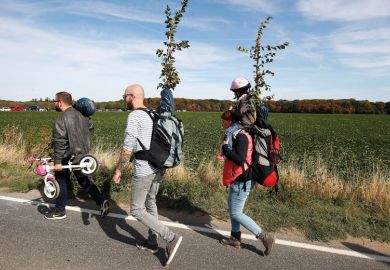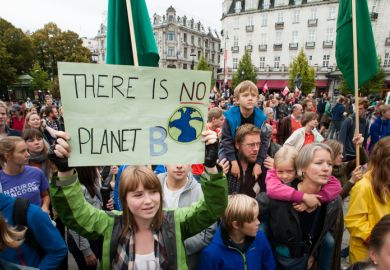UK universities and colleges are joining forces to draw up new plans designed to reduce their greenhouse gas emissions to net zero.
The Climate Commission, which will officially be launched on 13 November, brings together Universities UK, GuildHE, The Alliance for Sustainability Leadership in Education (EAUC) and the Association of Colleges. It will formulate an action plan to help members meet the target by 2050 at the latest.
The commission’s work will cover: leadership and governance, such as how institutions make financial decisions and influence their staff; estates and operations; how they make sustainable choices when it comes to campus suppliers; how they take action in learning and teaching, including making sure that students understand climate change and are prepared for the future; how they address the issue in their research and how university knowledge creation can create a pathway to carbon neutrality; and partnerships and engagement, such as working with local authorities.
James Longhurst, professor of environmental science at the University of the West of England, and EAUC’s representative on the commission, said that there were difficult decisions ahead.
“This is a challenge that we as a sector need to rise to; we need to take a leadership role,” he said. “That will follow from bringing organisations together to share what they are doing but also to plot how to get to that target [to carbon neutrality].”
Judith Petts, vice-chancellor of the University of Plymouth and the UUK representative, added that although there was already a lot of good work going on in the sector, it was important that there is a body to “always question how you are doing and how you are performing. That’s a really important role.”
Professor Petts agreed that there would be difficult but important conversations ahead. “We need to think about internationalisation and what that means for increasing our carbon footprint...Travel is another example, we have to see how we can do things differently,” she said. “It’s not easy to reduce your own emissions as institutions but the commission will produce good guidance that everyone will use.”
Register to continue
Why register?
- Registration is free and only takes a moment
- Once registered, you can read 3 articles a month
- Sign up for our newsletter
Subscribe
Or subscribe for unlimited access to:
- Unlimited access to news, views, insights & reviews
- Digital editions
- Digital access to THE’s university and college rankings analysis
Already registered or a current subscriber?








